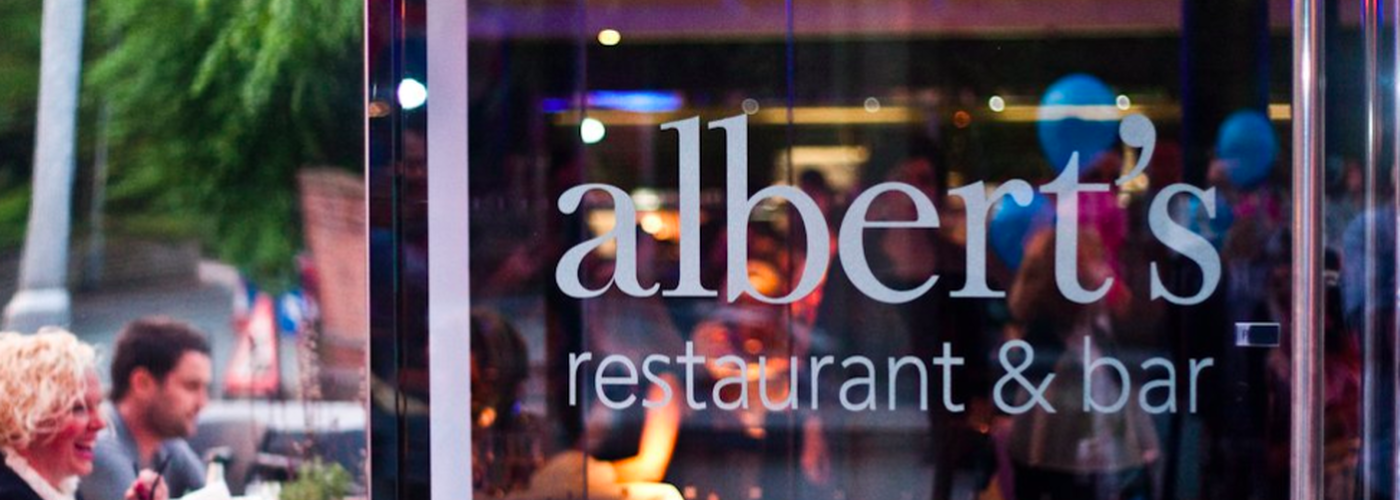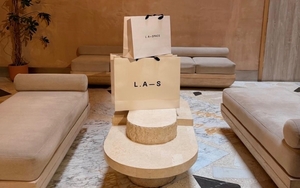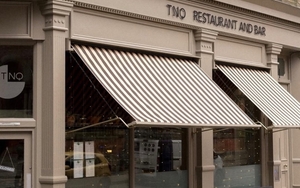A former employee of Albert’s restaurant accuses bosses of pocketing tips and fining employees
Tipping is back in the news, as Labour leader Jeremy Corbyn pledges that a Labour government would create a law to ensure hospitality staff receive 100% of their tips. In a video posted to his Twitter account, Corbyn said employers who take a cut of their workers’ tips should be “ashamed of themselves”.
“This robbery in plain sight is happening to workers in restaurants and bars across the country,” he states. “Customers give a tip expecting it to go to the people who have actually earned it, not to go into the pockets of their bosses.”
Emma Smith, 27, a former employee of Albert’s restaurant in Didsbury, is one such employee who claims to have paid heavily into the pockets of her bosses.
Earlier this month, Smith resigned from her part-time role waiting on tables at Albert’s, calling owners Elle R Leisure a “greedy company” which deducts tips with little explanation, fines employees for making mistakes, and charges workers for breaks they’re usually too busy to take.
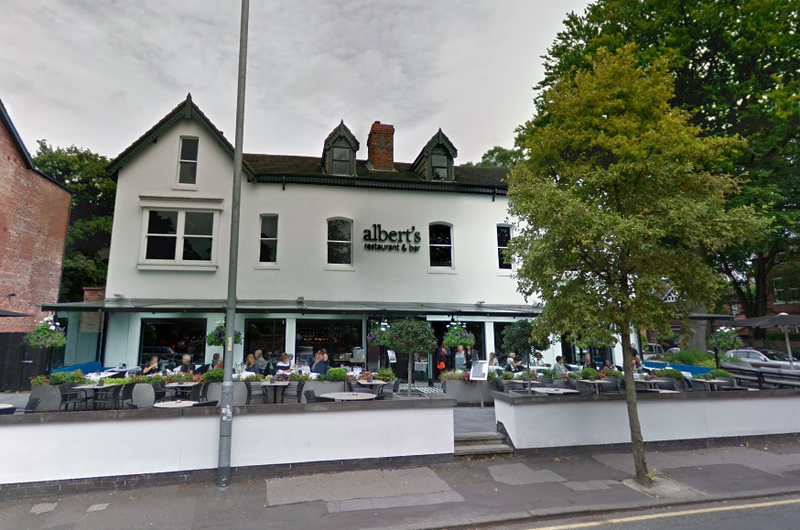
Speaking to Confidential, Smith said: “It was horrible, the hardest that I’ve ever been worked. I’ve done waitressing before, but we were so overstretched and they expected so much.”
“After a few weeks I saw a huge chunk of my tips from card payments going into something called ‘House Didsbury’. When I asked what this was I was told by management that it went into things such as staff training – but I didn’t receive any, I just shadowed another waitress for awhile. I was told this was ‘just the way it was’.”
Smith sent Confidential a copy of a payslip from Elle R Leisure dated 14th April 2018. The payslip appears to show a total of £123.62 earned in tips, with deductions of £60.91 to ‘House Didsbury’ and £12.18 to ‘Kitchen Tip Out’ – a total deduction of £73.09 (around 60%).
“One day I threatened to ask the owners what this ‘House Didsbury’ was,” Smith tells us, “but they told me I’d be sacked for doing so. But where’s it go? It’s my money.”
And that’s not the worst of it.
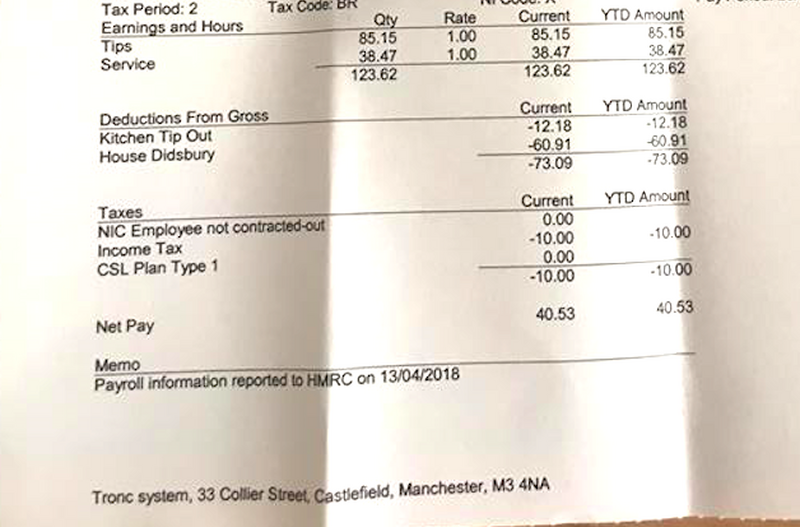
As the server got further into her five-month stint at the modern British restaurant – part of a group including Dukes92 and Albert’s Shed in Castlefield – she began to notice more unscrupulous activity by the company.
Smith said: “They were taking 3% of our total sales from our pay packets, because they assumed we’d made 10% service charge tip from card sales. But often customers asked that the service charge be removed from the bill – so we’d actually end up out of pocket. For a £800 bill I could end up paying the company £24, even if I’d made no tip. It’s crazy.”
Things got even worse for staff at Albert’s when a new manager enacted draconian rules, fining staff for making mistakes.
“They announced that any mistakes made on the till would be taken from our pay,” she said, “but when the restaurant is full and there’s only two servers on you’re bound to make mistakes. We were being charged up to £4 per starter and £8 per main for mistakes, and that’s per table.
“When you’re on minimum wage, factor in mistakes and fines and you could end up working for free or even for minus figures – that’s got to be illegal,” she added.
A hospitality industry consultant said they could be in breach of minimum wage regulations.
Immoral? Certainly. Illegal? Maybe. Tipping in the hospitality industry is a notoriously grey area, painfully lacking in clarity, consistency and transparency for both us, the diners (How much should we tip? Who do we tip? How much do they get?), and for the workforce (Why the deductions? What is a tronc? Is this fair?)
In 2016, business secretary Sajid Javid pledged to take action on shady tipping practices, after it emerged that many high street chains – including Pizza Express, Las Iguanas and Cote – were actively keeping or redistributing staff tips. Two years on and the government appears to have done very little, though many of the high street chains have, under public and media pressure, amended their tipping policies.
Despite the confusion, a hospitality industry consultant (who wished to remain unnamed) told Confidential that practices such as those allegedly taking place at Albert’s could be in breach of minimum wage regulations.

Confidential contacted the owner of Elle R Leisure, James Ramsbottom, who rejected many of the claims made by his former employee. He said:
“The majority of what Ms. Smith is saying is simply untrue. Over 90% of tips earned, go to staff on site.
"Good service is a team effort and servers are expected to make a contribution to kitchen staff, bar staff and other restaurant staff who don’t directly receive tips but are all part of providing great service. Therefore a proportion of a server's tips are distributed fairly amongst the rest of the team.
"Nevertheless a full time Albert’s server can expect to earn the equivalent of £35,000 or more,” he added.
£35,000? That seems very decent. Unless, of course, every one of that server’s tables pay by card and request to have the service charge removed. In which case, it is likely that the employee, paying (as Smith claims) 3% of their total sales back to the company, would end up working for nothing, or even paying Mr Ramsbottom for the pleasure of being there.

When asked whether his restaurant had ever charged employees for making mistakes while on shift, Ramsbottom said:
“Very occasionally staff have been asked to contribute towards mistakes made but this has only amounted, in total, to £170 in the last twelve months.
“Again this system is in place to ensure good service," he continued. "If a server makes persistent errors, it can massively affect service, not just to the table in question, but the whole restaurant. However this is very rarely used and is at the discretion of the manager.”
Of course, a sensible way to ensure good service in a restaurant would be not to fine employees for making mistakes when overstretched and overworked, but to employ enough people to healthily run a restaurant in the first place.
And what about the £60.91 deducted from Emma Smith’s payslip and redistributed to the mysterious, aforementioned ‘House Didsbury’?
“I’m not sure,” says Ramsbottom. “I’d have to put that to my FD [financial director].”
So even the boss doesn’t know where the money goes.
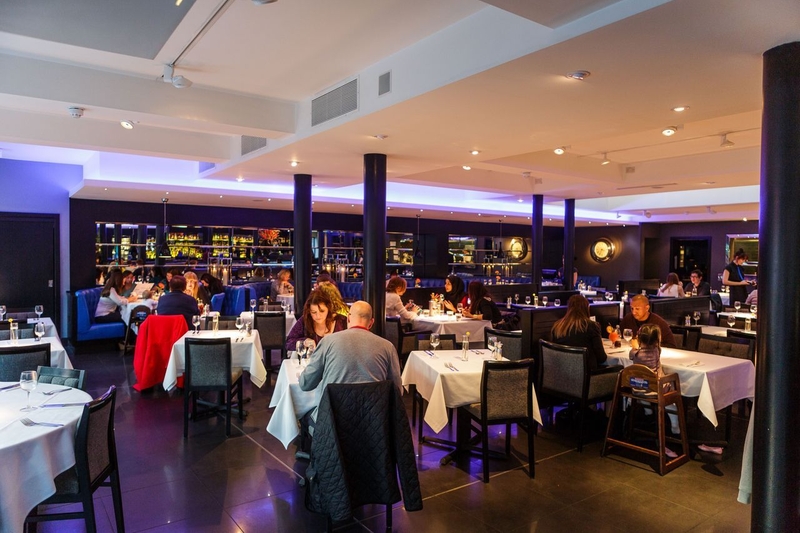
Unsurprisingly, Smith is unimpressed by Ramsbottom’s response. “The thing is they know they’re in the wrong. We were told that if a customer asks if we received all tips on card payments we had to say yes, otherwise we’d be sacked on the spot. A guy got sacked for doing this to a secret shopper a couple of months ago.”
And it’s not the first time Albert’s restaurant has been pulled up for poor tipping practice. In 2015, Elle R Leisure admitted to the MEN that service charge paid by larger parties was going directly to the company, not to staff.
Confidential put Smith’s case to the shadow business secretary and Salford MP Rebecca Long-Bailey. She said: “It's not fair that hardworking staff across the country are forced to hand over their tips to their employers in some cases.
“Bosses should not be using the pretext of phoney admin fees, till shortages or customer walkouts to take tips off staff.”
The crucial thing about tipping is that it has integrity
A grey area or not, what is clear is that business practices such as these – which see some of the hardest working and lowest paid workers ripped off by their employers – are not only unethical, they are a blight on the entire hospitality industry.
So what should be done about it? The question, says Hawksmoor co-owner Will Beckett, is one of integrity.
"The crucial thing about tipping is that it has integrity; at Hawksmoor that means that 100% of tips and service charges go to staff.
"While I have seen a small number of restaurateurs operate with integrity and do something slightly different to us, I think the easiest way to make a judgement is through transparency - let your staff and customers know what you're doing."
Well said. Transparency is key. Unless, of course, what your company is doing is completely shameful and an embarrassment to the industry. In which case, you're probably better taking a long hard look at yourselves... but not for too long. Time is money. Your money. All your money.
Confidential is calling for more transparency from restaurants and bars when it comes to tipping, and intends to publish a 'List of Shame' of employers who actively seek to deduct tips from their employees.





